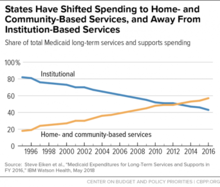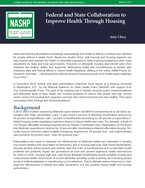Found 14 resources.
0
0
0
As the population ages, one of the greatest challenges facing state officials is how to organize and pay for long-term services and supports (LTSS) for low-income elderly and disabled adults—the most complex, expensive, and fastest-growing group covered by Medicaid. To help address this challenge, a toolkit for state leaders published in 2017 has been updated.
Topics: Disabilities, Health, Low-income, Medicaid / Medicare, Partnerships, Seniors
 Shared by Housing Is
on Mar 26, 2019
Shared by Housing Is
on Mar 26, 2019 0
0
0
A whole host of factors — such as friends, housing and transportation — affect a person’s health and how much they need the social safety net. It’s time the government’s big health insurance programs took this reality into account, some lawmakers and policymakers are starting to argue.
Topics: Asset building, Cost effectiveness, Disabilities, Education, Food insecurity, Funding, Health, Homelessness, Housing, Legislation & Policy, Low-income, Medicaid / Medicare, Seniors, Transportation, Workforce development
 Shared by Housing Is
on Jan 25, 2019
Shared by Housing Is
on Jan 25, 2019 0
0
0

The Denver Housing Authority (DHA) wins a 2017 Award of Excellence in Client and Resident Services for creating the Health Navigators (HN) program, which provides mental health education, resources, and doctor referrals.
Topics: Disabilities, Health, Housing, Low-income, Medicaid / Medicare, Mental health, Partnerships, Place-based, Seniors
0
0
0
In response to the heightened interest in the relationship between work and the health of individuals and communities, CMCS has clarified that Medicaid funds cannot be used to pay beneficiaries’ wages, but can pay for employment counseling as an optional benefit—to help people get jobs. Years of experience with work requirements for the Supplemental Nutrition Assistance Program, Aid to Families with Dependent Children, and populations with disabilities have developed the evidence for what is needed to help different populations find and keep jobs.
Topics: Affordable Care Act, Disabilities, Health, Legislation & Policy, Low-income, Medicaid / Medicare, Research, Stability, Workforce development
0
0
0

Some seniors and people with disabilities receiving home- and community-based services (HCBS) could lose their Medicaid eligibility and have to go into nursing homes to get needed care if Congress adjourns without extending “spousal impoverishment” protections that are set to expire on December 31.
Topics: Affordable Care Act, Disabilities, Legislation & Policy, Medicaid / Medicare, Seniors
0
0
0
Studies have consistently documented high rates of obesity and tobacco use among individuals with serious mental illness. In recent years, Medicaid programs have enrolled individuals with serious mental illness into managed care plans, which are responsible for ensuring that their members receive preventive care. Despite the movement to managed care, not much is known about whether this population receives routine screening and follow-up care for common comorbid health conditions and health behaviors.
Topics: Disabilities, Health, Low-income, Medicaid / Medicare, Mental health, Preventative care, Research
0
0
0
In the first session of this series, Foothold Technology Director of Client Services, Paul Rossi and Senior Advisor, David Bucciferro, along with Sue Augustus from CSH, bring us back to basics of all things Medicaid. They cover topics ranging in commonly used terms, coverage and eligibility and the differences between Medicaid and Medicare. This webinar series is designed for beginners and experts alike. Beginners will walk away with a strong foundation and experts will have the opportunity to contribute to the conversation.
Topics: Affordable Care Act, Disabilities, Health, Low-income, Medicaid / Medicare
0
0
0
Everyone needs safe, decent, stable housing. For some of the most vulnerable people in America — people with mental illness, chronic health conditions, histories of trauma, and other struggles — a home helps them to get adequate treatment and start on the path toward recovery. But some conditions make it difficult for people to maintain a stable home without additional help. Supportive housing, a highly effective strategy that combines affordable housing with intensive coordinated services, can provide that needed assistance.
Topics: Cost effectiveness, Disabilities, Health, Homelessness, Housing, Low-income, Medicaid / Medicare, Mental health, Place-based, Seniors, Supportive housing
 Shared by Housing Is
on Aug 9, 2018
Shared by Housing Is
on Aug 9, 2018 0
0
0
Social determinants of health are the economic and social conditions that affect health outcomes and are the underlying, contributing factors of health inequities. Examples include housing, educational attainment, employment and the environment.
Topics: Affordable Care Act, Disabilities, Health, Homelessness, Housing, Low-income, Medicaid / Medicare, Mental health, Partnerships, Place-based, Substance abuse, Supportive housing
 Shared by Housing Is
on Aug 9, 2018
Shared by Housing Is
on Aug 9, 2018 0
0
0
On January 1, 2014, in states that have chosen to expand Medicaid eligibility under the Affordable Care Act, nearly all chronically homeless people who lacked health insurance became eligible for Medicaid. This Primer offers state Medicaid officials and other interested parties strategies for using Medicaid to meet the needs of this very vulnerable population--some strategies that have succeeded in the past and some that are emerging under provisions of the Affordable Care Act.
Topics: Affordable Care Act, Criminal justice, Disabilities, Dual-eligibles, Funding, Health, Homelessness, Housing, Low-income, Medicaid / Medicare, Mental health, Partnerships, Stability, Substance abuse, Supportive housing
 Shared by Housing Is
on Jul 27, 2018
Shared by Housing Is
on Jul 27, 2018 0
0
0
Part of New York State’s Homelessness Action Plan includes an investment of new supportive housing resources and services over the next five years to address vulnerable populations experiencing homelessness. Therefore, the availability of and access to various support services such as employment and training opportunities, parenting, counseling, independent living skills training, primary healthcare, substance disorder treatment and mental health care, child care, and benefits advocacy are critical components of any project funded under this plan.
Topics: Cost effectiveness, Criminal justice, Disabilities, Domestic violence, Foster care, Funding, Homelessness, Housing, Medicaid / Medicare, Mental health, Substance abuse, Supportive housing, Youth
 Shared by Housing Is
on Jul 23, 2018
Shared by Housing Is
on Jul 23, 2018 0
0
0
In December 2016, federal and state policymakers examined health and housing issues at a meeting convened in Washington, D.C., by the National Academy for State Health Policy (NASHP) with support from The Commonwealth Fund. The goal of the meeting was to identify concrete policy recommendations and actionable steps to align health and housing programs to ensure that people with high service needs receive the housing and supportive services they need to become and stay healthy. This report summarizes their findings and recommendations
Topics: Data sharing, Disabilities, Health, Homelessness, Legislation & Policy, Low-income, Medicaid / Medicare, Partnerships, Supportive housing
 Shared by Housing Is
on Jul 19, 2018
Shared by Housing Is
on Jul 19, 2018 0
0
0
This article deconstructs the history, structure, and financing that have made this unique partnership between Philadelphia's Department of Behavioral Health and Intellectual Disabilities, the Office of Homeless Services, and the Housing Authority, possible.
Topics: Data sharing, Disabilities, Dual-eligibles, Health, Housing, Legislation & Policy, Low-income, Medicaid / Medicare, Mental health, Partnerships, Preventative care, Research, Supportive housing
 Shared by Housing Is
on Jul 12, 2018
Shared by Housing Is
on Jul 12, 2018 0
0
0
In December 2016, federal and state policymakers examined the intersection of unstable housing and negative health outcomes at a meeting convened in Washington, D.C., by the National Academy for State Health Policy (NASHP) with support from The Commonwealth Fund. The goal of the meeting was to identify concrete policy recommendations and actionable steps to align health and housing programs to ensure that people with high service needs receive the housing and supportive services they need to become and stay healthy. This report summarizes their findings and recommendations.
Topics: Child welfare, Cost effectiveness, Data sharing, Disabilities, Dual-generation, Health, Homelessness, Housing, Legislation & Policy, Low-income, Medicaid / Medicare, Partnerships, Seniors, Supportive housing
 Shared by Housing Is
on Jul 10, 2018
Shared by Housing Is
on Jul 10, 2018 






